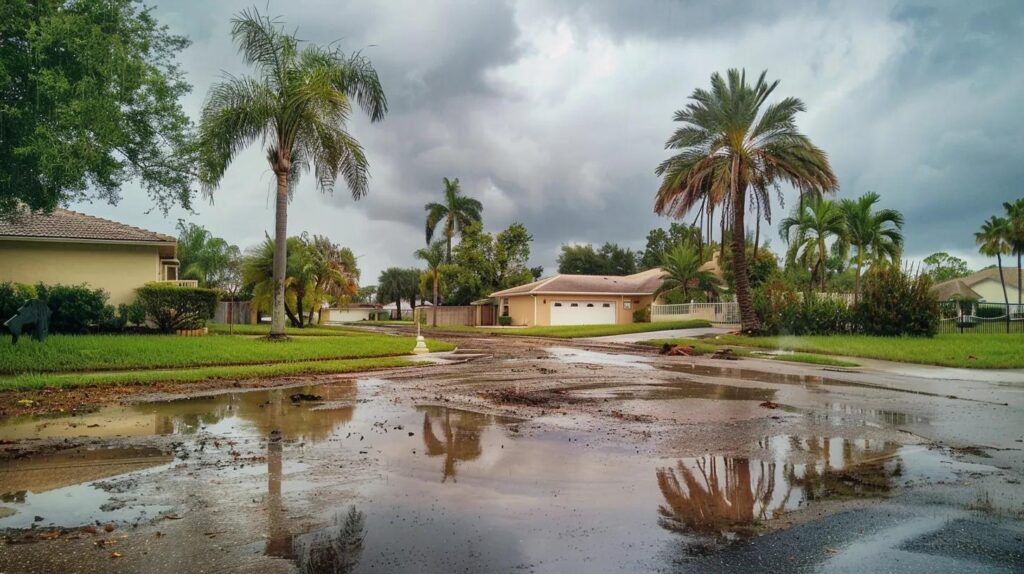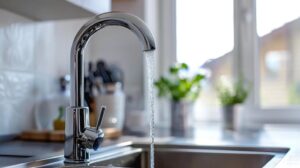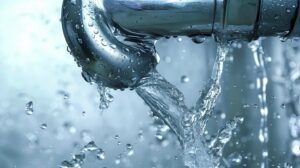September marks the peak of Florida’s rainy season, bringing intense downpours, tropical storms, and the highest precipitation levels of the year. For homeowners throughout the Treasure Coast and South Florida, this period puts outdoor plumbing systems under tremendous stress. While your indoor plumbing gets regular attention, outdoor fixtures like garden spigots, irrigation lines, and drainage systems often go unnoticed until problems arise. Proper preparation now can prevent costly water damage and ensure your outdoor plumbing systems function reliably through the wettest months ahead.
Understanding Florida’s Wet Season Impact on Outdoor Plumbing
Florida’s wet season typically runs from May through October, with September historically receiving the highest rainfall totals. The combination of daily thunderstorms, tropical systems, and occasional hurricanes creates unique challenges for outdoor plumbing infrastructure throughout St. Lucie County, Martin County, and Palm Beach County.
Heavy rainfall saturates soil around buried pipes, increasing pressure on underground lines and potentially causing shifts that stress connections. Temperature fluctuations between hot, sunny periods and cooler storm systems cause expansion and contraction in pipes and fittings. Standing water from poor drainage can infiltrate pipe joints and electrical connections, leading to corrosion and premature failure.
Outdoor fixtures face additional challenges from debris carried by storm runoff, increased water pressure from municipal systems during peak demand periods, and potential flooding that can damage exposed components. Understanding these seasonal stresses helps homeowners take proactive steps to protect their outdoor plumbing investments.
Garden Spigot Maintenance and Winterization
Garden spigots, also called hose bibs or outdoor faucets, are among the most vulnerable outdoor plumbing fixtures during Florida’s wet season. These fixtures experience constant exposure to moisture, temperature changes, and physical stress from hose connections and usage.
Inspecting Spigot Components: Begin your wet season preparation by thoroughly inspecting all outdoor spigots. Look for signs of corrosion around the valve stem, handle, and connection points. Check for loose packing nuts that may allow water to leak around the valve stem. Test the operation of each spigot, ensuring smooth handle operation and complete shutoff when closed.
Examine the spigot mounting to ensure it remains securely attached to the house. Loose mounting can allow water to penetrate wall cavities, causing extensive damage that may not be visible until significant problems develop. Pay special attention to caulking and weatherproofing around spigot penetrations through exterior walls.
Protecting Against Water Intrusion: Apply fresh caulk around spigot installations where the fixture penetrates exterior walls. Use a high-quality silicone caulk designed for outdoor use and temperature fluctuations. Remove old, cracked caulk completely before applying new material to ensure proper adhesion and water seal.
Consider installing spigot covers or guards to protect fixtures from direct rainfall and debris impact. While Florida doesn’t typically require freeze protection, covers can prevent debris accumulation and reduce direct weather exposure that accelerates wear.
Pressure Testing and Flow Checks: Test water pressure at each spigot to identify potential problems with supply lines or internal components. Significantly low pressure may indicate partial blockages, while inconsistent pressure could signal valve problems that need professional leak detection services.
Check for proper drainage around spigot locations. Standing water near outdoor fixtures can infiltrate foundations and cause ongoing moisture problems. Grade soil away from spigots and ensure adequate drainage in surrounding areas.
Irrigation System Preparation for Heavy Rainfall

Irrigation systems face unique challenges during Florida’s wet season, when natural rainfall may provide more water than landscapes need while simultaneously stressing system components with flooding and debris.
Controller and Timer Adjustments: Modern irrigation controllers should include rain sensors that automatically shut off systems during rainfall. Test these sensors regularly and replace batteries in wireless units. Adjust timer settings to account for increased natural rainfall, reducing irrigation frequency and duration to prevent overwatering that can damage landscapes and waste water.
Consider upgrading older systems without rain sensors, as these devices can significantly reduce water usage and prevent system operation during storms when components are most vulnerable to damage.
Valve and Zone Testing: Test each irrigation zone individually to ensure proper operation before the heaviest rainfall periods. Look for broken or misdirected sprinkler heads that could waste water or create drainage problems. Check valve boxes for standing water, which indicates drainage problems that need correction.
Clean debris from valve boxes and ensure covers fit properly to prevent water and pest intrusion. Replace any damaged valve box covers, as water intrusion can cause electrical problems and corrosion of valve components.
Underground Line Integrity: Inspect visible portions of irrigation lines for damage, especially where lines cross walkways or emerge from ground level. Heavy rainfall can wash away soil cover, exposing pipes to damage from foot traffic or equipment.
Mark irrigation line locations before wet season activities like tree trimming or landscape maintenance that could damage buried lines. Professional leak detection services can locate and map irrigation lines if original installation records are unavailable.
Backflow Prevention Compliance: Irrigation systems require backflow prevention devices to protect potable water supplies from contamination. Annual backflow testing is required by law in most Florida municipalities and becomes even more critical during wet season when flooding can introduce contaminants into irrigation systems.
Schedule backflow prevention testing before peak rainfall months to ensure compliance and protect your water supply. Failed backflow devices must be repaired or replaced immediately to maintain legal compliance and safety.
Outdoor Drain Maintenance and Flood Prevention
Outdoor drainage systems become critical during Florida’s intense rainfall periods. Clogged or inadequate drainage can cause flooding that damages structures, landscapes, and other plumbing systems.
French Drain and Surface Drain Inspection: Clean all outdoor drains of debris, leaves, and sediment that accumulate throughout the year. Use a garden hose to flush drain lines and identify potential blockages. For persistent clogs, professional drain cleaning services can clear blockages without damaging drain lines.
Inspect drain grates and covers for damage or corrosion that could allow debris to enter drainage systems. Replace damaged covers before heavy rainfall periods to prevent clogging from storm debris.
Gutter and Downspout Integration: Ensure gutters and downspouts direct water away from foundations and outdoor plumbing fixtures. Clogged gutters can overflow and saturate soil around spigots, valve boxes, and other outdoor plumbing components.
Consider extending downspouts or adding splash blocks to direct water further from structures. Poor drainage around foundations can affect underground plumbing lines and create moisture problems that persist long after storms pass.
Yard Grading and Drainage Patterns: Evaluate overall yard drainage patterns and identify areas where water pools during typical rainfall. These problem areas often indicate inadequate drainage that can worsen during heavy rainfall periods.
Improve drainage by regrading problem areas, adding drainage channels, or installing additional drains where needed. Proper surface drainage protects outdoor plumbing systems and prevents water intrusion into structures.
Pool and Spa Plumbing Considerations
Swimming pools and spas have extensive outdoor plumbing systems that require special attention during Florida’s wet season. Heavy rainfall can overwhelm pool systems, dilute chemical treatments, and introduce contaminants that affect water quality and equipment operation.
Equipment Protection and Access: Ensure pool equipment has adequate drainage and protection from flooding. Pool pumps, heaters, and electrical systems should be elevated above potential flood levels. Check that equipment enclosures drain properly and don’t trap water that could damage components.
Maintain clear access to pool equipment for emergency shutoffs during severe weather. Know the location of electrical disconnects and gas shutoffs for pool heaters, and ensure family members understand emergency procedures.
Skimmer and Drain Operation: Clean pool skimmers and ensure proper operation before peak rainfall periods. Overflowing pools from excessive rainfall can damage decking and surrounding structures if drainage systems aren’t functioning properly.
Test main drains and return lines to ensure unrestricted flow. Debris in pool circulation systems can cause equipment damage and water quality problems that become more severe during periods of heavy rainfall and reduced maintenance access.
Chemical System Adjustments: Heavy rainfall dilutes pool chemicals and can introduce contaminants that require additional treatment. Prepare chemical systems for increased demand and consider automatic dosing systems that maintain proper water chemistry even during extended rainfall periods.

Septic System Outdoor Components
Homes with septic systems have additional outdoor plumbing considerations during Florida’s wet season. Saturated soil conditions can affect septic system operation and create health hazards if systems malfunction.
Drain Field Protection: Avoid driving or placing heavy objects on drain field areas during wet conditions when soil is saturated. Compacted soil reduces the system’s ability to process wastewater effectively and can cause backups into the home.
Identify and mark drain field boundaries to prevent accidental damage during landscaping or construction activities. Saturated conditions make drain fields more vulnerable to damage from normal activities.
Inspection and Pumping Schedule: Consider septic tank pumping before peak rainfall periods, especially if the system is approaching recommended service intervals. Full tanks are more likely to experience problems during periods of heavy rainfall and saturated soil conditions.
Schedule septic system inspections to identify potential problems before they become serious during challenging weather conditions. Early identification of issues allows for repairs during favorable weather when access and working conditions are optimal.
Underground Utility Protection
Underground plumbing lines face increased risks during Florida’s wet season from soil saturation, erosion, and potential flooding. Protecting these buried assets requires attention to surface conditions and drainage patterns.
Utility Marking and Documentation: Ensure underground utility lines are properly marked and documented. Heavy rainfall can wash away temporary markings, and landscape changes can obscure utility locations. Maintain accurate records of underground plumbing line locations for future reference.
Contact utility marking services before any excavation or landscape work, even during wet season when soil conditions make digging more challenging. Damaged underground utilities can cause expensive repairs and service interruptions.
Erosion Control Measures: Install erosion control measures around areas where underground lines are shallow or cross drainage paths. Heavy rainfall can expose buried pipes, making them vulnerable to damage and reducing their lifespan.
Monitor areas where underground lines cross property lines or easements, as these locations often experience more erosion and disturbance from maintenance activities.
Outdoor Electrical and Plumbing Integration
Many outdoor plumbing systems integrate with electrical components that require special protection during Florida’s wet season. Pool equipment, irrigation controllers, and outdoor lighting systems all combine electrical and plumbing elements.
GFCI Protection and Testing: Test all GFCI outlets and breakers that protect outdoor plumbing systems. These safety devices prevent electrical shock hazards but can become less reliable with age and exposure to moisture.
Replace any GFCI devices that don’t test properly before wet season when electrical hazards increase due to standing water and moisture intrusion.
Waterproof Connections and Enclosures: Inspect electrical connections associated with outdoor plumbing systems. Look for corrosion, loose connections, or damaged enclosures that could allow water intrusion.
Apply dielectric grease to electrical connections exposed to moisture, and ensure all electrical enclosures have proper drainage to prevent water accumulation.
Regional Considerations for Treasure Coast Areas
Different areas of the Treasure Coast face unique challenges during wet season that affect outdoor plumbing preparation strategies.
Coastal areas like Jensen Beach and Stuart face additional challenges from salt air that accelerates corrosion of outdoor fixtures. More frequent inspection and replacement of metal components may be necessary to prevent premature failure.
Inland areas such as Palm City and Port St. Lucie may experience different drainage challenges due to soil composition and elevation changes. Understanding local drainage patterns helps in planning effective flood prevention measures.
Areas with sandy soil may experience more pipe movement and stress during periods of heavy rainfall and subsequent drying. Regular inspection of connections and joints becomes more important in these soil conditions.
Professional Inspection and Maintenance Services
While homeowners can perform many outdoor plumbing preparation tasks, professional inspection and maintenance services provide expertise and equipment that ensure comprehensive system protection.
Professional services can pressure test irrigation systems to identify leaks that aren’t visible during normal operation. Complete home repiping assessments can determine if aging outdoor lines need replacement before they fail during challenging weather conditions.
Licensed plumbers have specialized equipment for clearing underground drains and can identify problems that aren’t apparent during surface inspections. Professional assessment is particularly valuable for complex systems like pool plumbing and integrated irrigation systems.
Emergency Preparedness for Outdoor Systems
Preparing for outdoor plumbing emergencies during wet season includes knowing shutoff locations, having emergency supplies readily available, and understanding when to seek immediate professional help.
Emergency Shutoff Procedures: Know the location of shutoff valves for irrigation systems, pool equipment, and individual outdoor fixtures. Practice operating these valves so they can be accessed quickly during emergency conditions.
Main water shutoff procedures become more critical during flooding when multiple outdoor systems may be affected simultaneously. Ensure emergency water shutoff information is accessible to all family members.
Flood Response Protocols: Develop specific procedures for outdoor plumbing systems during flood warnings. This includes shutting off electrical power to outdoor equipment, securing portable items that could block drains, and documenting system conditions for insurance purposes.
Have emergency contact information readily available for professional plumbing services, especially services familiar with your specific outdoor systems and equipment.
Seasonal Maintenance Calendar
Effective outdoor plumbing maintenance follows a seasonal schedule that prepares systems for challenging weather conditions while addressing wear and damage from previous seasons.
Pre-Wet Season (August-Early September): Complete major maintenance tasks including irrigation system overhauls, drain cleaning, and equipment servicing before peak rainfall begins. Schedule professional inspections and testing services while weather conditions allow optimal access and working conditions.
Peak Wet Season (September-October): Focus on monitoring and minor maintenance that can be performed safely during wet conditions. Regular inspection of drainage systems and prompt clearing of debris becomes critical during active storm periods.
Post-Wet Season (November-December): Assess systems for damage from heavy rainfall periods and plan repairs or replacements needed before the following wet season. This timing allows for optimal scheduling of major projects during favorable weather conditions.
Water Conservation During Wet Periods
Proper outdoor plumbing preparation includes water conservation measures that reduce system stress and environmental impact during periods of abundant natural rainfall.
Irrigation systems with rain sensors and moisture monitors can significantly reduce water usage during wet periods while maintaining landscape health. Smart controllers adjust watering schedules based on weather conditions and soil moisture levels.
Pool systems can utilize rainwater for filling, reducing demand on potable water supplies. Proper drainage design captures and redirects rainwater for beneficial uses while preventing flooding and erosion problems.
Long-Term System Planning
Preparing outdoor plumbing for wet season also involves long-term planning for system upgrades and improvements that increase reliability and reduce maintenance requirements.
Consider upgrading to more durable materials for outdoor fixtures and connections. Corrosion-resistant materials like PVC, CPVC, or specialized metals provide longer service life in Florida’s challenging environment.
Plan drainage improvements that address recurring problem areas. Professional design of surface and underground drainage systems provides long-term solutions to flooding and water intrusion problems.
Modern irrigation technologies including smart controllers, efficient sprinkler heads, and drip irrigation systems provide better performance while reducing water usage and maintenance requirements.
Investment Protection Through Preparation
Proper preparation of outdoor plumbing systems represents a significant investment in property protection and system longevity. The relatively small cost of preventive maintenance and preparation pays dividends in avoiding expensive emergency repairs and system replacements.
Regular maintenance extends system life, improves efficiency, and maintains property values. Well-maintained outdoor plumbing systems also provide better performance during challenging weather conditions when reliable operation becomes most critical.
Professional maintenance relationships provide peace of mind and priority service during emergency situations. Establishing service relationships before emergencies occur ensures faster response times and familiarity with your specific systems and needs.
Preparing your outdoor plumbing for Florida’s wettest months requires attention to detail, understanding of local challenges, and commitment to regular maintenance. The investment in preparation time and resources provides protection against costly damage while ensuring reliable system operation when you need it most. Whether you’re protecting garden spigots in Jupiter, maintaining irrigation systems in West Palm Beach, or ensuring proper drainage in Boynton Beach, thorough preparation makes the difference between minor inconveniences and major disasters during Florida’s challenging wet season.








